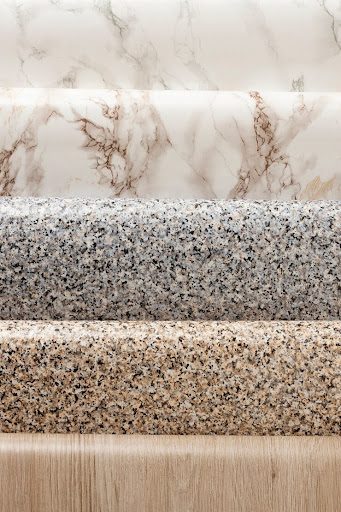
Quartz vs Granite in Kitchen Remodels
Understanding the Quartz vs Granite Debate
Quartz vs Granite is one of the most important decisions homeowners face during a kitchen remodel. When it comes to kitchen remodeling, countertops are one of the most important design and investment decisions you’ll make. Two of the most popular choices—quartz and granite—offer very different benefits and aesthetics. Understanding their properties can help you decide which material best suits your lifestyle, budget, and kitchen design goals.
Quartz is an engineered stone made from crushed natural quartz combined with resins and pigments, offering a uniform look and greater control over color and pattern. Granite, on the other hand, is a 100% natural stone quarried directly from the earth, each slab unique in pattern and appearance.
Durability and Maintenance: Key Considerations
Beyond aesthetics, the durability and maintenance requirements of quartz and granite play a significant role in the decision-making process. Quartz is known for its non-porous surface, making it highly resistant to stains, scratches, and bacteria. This inherent resistance translates to easier cleaning and less need for sealing. Granite, while naturally durable, is porous and requires regular sealing to prevent staining and bacterial growth. While sealing is a relatively simple process, it is an added maintenance step to consider. The choice between the two often comes down to a trade-off between the virtually maintenance-free nature of quartz and the robust, natural character of granite.
Cost and Installation: Weighing the Investment
The cost and installation process also differentiate quartz and granite. Generally, quartz and granite occupy a similar price range, but the specific cost can vary based on the grade, color, and veining of the material, as well as the complexity of the countertop design. Installation costs can also differ, as granite’s weight and natural variations may require more specialized labor and tools. It’s crucial to obtain quotes from reputable fabricators and installers, ensuring that the price includes material, fabrication, installation, and any necessary sealing or finishing treatments. A detailed cost breakdown will allow homeowners to make an informed decision that aligns with their budget and project scope.
Quartz vs Granite Appearance: Natural vs. Consistent Beauty
- Quartz
- Available in a wide range of colorsand patterns, many mimicking natural stone.
- Offers a more uniform, predictable appearance.
- Ideal for modern, minimalist, or sleek design aesthetics.
- Granite
- Unique, one-of-a-kind patterns created by nature.
- Ideal for homeowners seeking a natural, organic look.
- Some colors and veining may vary drastically from sample to slab.
Design Tip:If you want consistent veining and color across your countertop, quartz is a better option. For dramatic natural patterns, granite is your go-to.
Quartz vs Granite Durability and Maintenance
Quartz
- Non-porous surface resists stains, bacteria, and mold.
- No sealing required; easy to clean with soap and water.
- Heat-resistant but not heatproof—use trivets for hot pots.
Granite
- Porous surface needs regular sealing to resist stains and bacteria.
- Highly heat-resistant; can handle hot pans better than quartz.
- Slightly more prone to chipping around edges if not properly cared for.
Maintenance Verdict:Quartz is lower-maintenance and more forgiving for busy households, while granite requires a bit more upkeep.
Cost Comparison
- Quartz
- Typically ranges between $70–$100 per square foot, installed.
- Slightly more predictable in cost because it’s engineered and widely available.
- Granite
- Ranges between $60–$120 per square foot, depending on rarity and origin.
- Exotic or rare patterns can significantly increase the price.
Budget Tip:Granite can be more affordable if you choose local or more common varieties. Quartz offers consistent pricing and may be more cost-effective for larger projects.
Quartz vs Granite Environmental Impact
- Quartz
- Considered more eco-friendly due to consistent sourcing and minimal production waste
- Some brands use recycled materials or low-emission resins
- Granite
- Mined from the earth; transportation from quarry to home increases carbon footprint.
- Limited availability of truly sustainable or eco-conscious options
Eco Insight:If sustainability is a concern, look for quartz brands that promote green manufacturing practices or use recycled content.
Quartz vs Granite Resale Value and Buyer Preferences
Both quartz and granite are top choices for homebuyers and can significantly enhance resale value. However, quartz is gaining popularity in modern homes due to its sleek appearance and low maintenance, especially in urban and contemporary markets. Granite remains a strong choice in traditional or luxury designs.
Which Should You Choose for Your Kitchen Remodel?
Appearance
- Quartz: Consistent, engineered look
- Granite: Unique, natural beauty
Durability
- Quartz: Non-porous and stain-resistant
- Granite: Heat-resistant but requires regular sealing
Maintenance
- Quartz: Low maintenance, easy to clean
- Granite: Higher maintenance, needs periodic sealing
Cost
- Quartz: Predictable pricing
- Granite: Cost varies with pattern and rarity
Eco-Friendliness
- Quartz: Often more sustainable and uses recycled materials
- Granite: Less eco-friendly due to mining and transport
Buyer Appeal
- Quartz: Popular in modern, sleek homes
- Granite: Favored in classic, high-end designs
Final Verdict:Choose quartz if you prioritize easy maintenance, uniform design, and sustainability. Go with granite if you prefer natural beauty, heat resistance, and timeless elegance.
Making the Right Choice for Your Kitchen
Ultimately, the choice between quartz and granite is a personal one. There is no objectively “better” material; the optimal choice depends on individual preferences, lifestyle, and design vision. Consider your priorities: If you value low maintenance and a consistent aesthetic, quartz may be the ideal choice. If you prefer the unique beauty and natural character of stone, and are willing to invest in regular maintenance, granite could be the perfect fit. Visiting showrooms, examining sample slabs, and consulting with kitchen design professionals can help you visualize how each material will look in your space and ensure that you make a decision you’ll be happy with for years to come.
Ready to Transform Your Home?
At Mazzamuto Construction, we believe great spaces start with thoughtful planning and skilled craftsmanship. Whether you’re exploring ideas or ready to build, our team is here to guide you every step of the way. Let’s bring your vision home—reach out for a personalized consultation today!
Frequently Asked Questions (FAQ)
1. Is quartz better than granite for kitchen countertops?
It depends on your priorities. Quartz is lower maintenance and more consistent in design, while granite offers natural beauty and greater heat resistance.
2. Does quartz scratch more easily than granite?
Both are durable, but granite is slightly harder. However, quartz is more resistant to staining and bacteria.
3. Which countertop is more eco-friendly?
Quartz, especially from manufacturers that use recycled materials or sustainable production methods.
4. How often does granite need to be sealed?
Granite should be sealed once every 1–3 years, depending on use and type.
5. Can I use quartz or granite outside?
Granite is better suited for outdoor use due to its natural resistance to UV rays. Quartz may discolor if exposed to direct sunlight over time.
Key Takeaways
- Quartz and granite are both excellent countertop choiceswith distinct benefits.
- Quartz is ideal for consistent style, easy maintenance, and modern appeal.
- Granite offers unique natural beauty and superior heat resistance.
- Budget, lifestyle, and design goals should guide your decision.
- Consult with professionals to ensure you choose the best material for your remodel.




